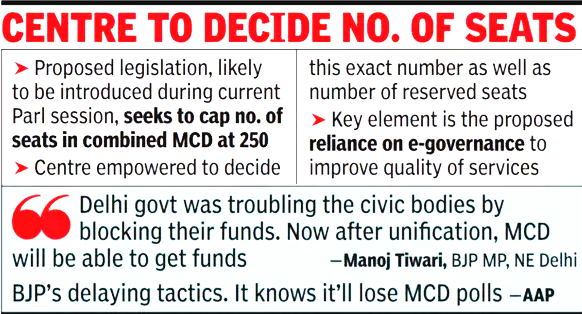Governance
Municipal Corporation (Amendment) Bill 2022
- 25 Mar 2022
- 5 min read
For Prelims: Urban Local Governments, Municipal Corporations, 74th Amendment to the Indian Constitution.
For Mains: Challenges to functional autonomies of urban local bodies.
Why in News?
The Municipal Corporation (Amendment) Bill 2022 is likely to be tabled in the Parliament.
- It aims to merge the Capital’s three municipal corporations — South, North and East — ten years after the trifurcation of the civic body.
What is the background and Need for Reunification?
- Background:
- In 2011, the government proposed the trifurcation of the MCD for better efficiency.
- The ministry of home affairs then cleared the proposal in November 2011, following which the Delhi government convened a special assembly session and passed the Delhi Municipal Corporation (Amendment) Bill in December 2011.
- The final notification for the trifurcation was issued in January 2012, carving out North, South, and East Delhi municipal bodies with 104 awards given to the first two, and 64 to the latter.
- Need:
- Face Multiple Problems:
- Trifurcated MCDs faced multiple problems over the years, such as non-payment of salaries of safai karamcharis (sweepers), uneven distribution of property tax between three civic bodies, inefficient management and growing losses, etc.
- Uneven Division:
- The trifurcation was uneven in terms of the territorial divisions and revenue-generating potential of each corporation.
- As a result, there was a huge gap in the resources available to the three corporations, vis-a-vis their obligations.
- Widened Gaps:
- The gap has widened over a period of time, increasing the financial difficulties of the three municipal corporations, leaving them incapacitated to make timely payment of salaries and retirement benefits to their employees and thereby creating serious impediments in maintaining civic services in Delhi.
- Face Multiple Problems:
What is a Municipal Corporation?
- About:
- In India, the Municipal Corporation is the urban local government that is responsible for the development of any Metropolitan City having a population of more than one million people.
- Mahanagar Palika, Nagar Palika, Nagar Nigam, City Corporation, and so on are some of the other names for it.
- The Municipal Corporations are established in the states by the acts of the state legislatures, whereas in the Union Territories through the acts of the Parliament.
- Municipal governments rely heavily on property tax revenue to fund their operations.
- The first municipal corporation in India was created in Madras in 1688, followed by municipal corporations in Bombay and Calcutta in 1726.
- In India, the Municipal Corporation is the urban local government that is responsible for the development of any Metropolitan City having a population of more than one million people.
- Need for creation of Municipal Corporation:
- The growing population and urbanisation in India's cities necessitated the establishment of a local governing body capable of collecting property taxes and fixed grants from the state government in order to provide essential community services such as health care, education, housing, and transportation.
- Constitutional Provisions:
- In the Constitution of India, no provision was made for the establishment of local self-government, except the incorporation of Article 40 in the Directive Principles of State Policy.
- The 74th Amendment Act, 1992 has inserted a new Part IX-A into the Constitution which deals with the administration of Municipalities and Nagar Palikas.
- It consists of Article 243P to 243ZG. It also added a new twelfth schedule to the Constitution. The 12th schedule consists of 18 items.
- Composition:
- Each municipal region is divided into geographical constituencies known as wards based on the population of that particular city.
- Each ward elects a representative, who is chosen by the residents of that ward. Members of the wards committee are elected for a five-year term on the basis of adult franchise.
- A councillor or corporator is a chosen representative of a certain ward.
- The population of a city determines the number of wards in a municipal area. Scheduled castes, scheduled tribes, disadvantaged classes, and women have seats reserved.
UPSC Civil Services Examination, Previous Year Questions (PYQs)
Which of the following provisions of the Constitution of India have a bearing on Education? (2012)
- Directive Principles of State Policy
- Rural and Urban Local Bodies
- Fifth Schedule
- Sixth Schedule
- Seventh Schedule
Select the correct answer using the codes given below:
(a) 1 and 2 only
(b) 3, 4 and 5 only
(c) 1, 2 and 5 only
(d) 1, 2, 3, 4 and 5
Ans: (d)





